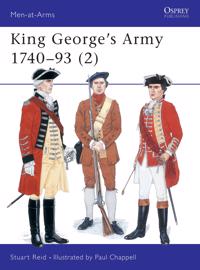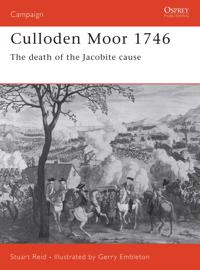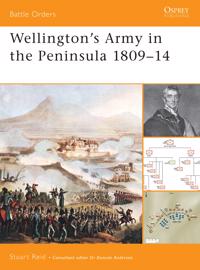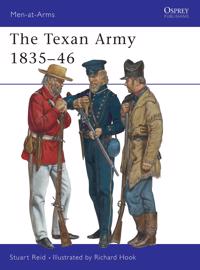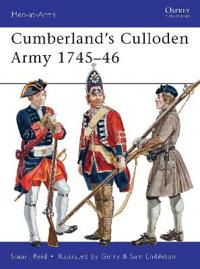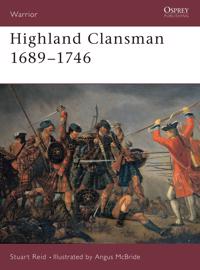King George's Army 1740-93 (Pocket)
avStuart Reid, Paul (ILT) Chappell, Stuart Reid
ISBN: 9781855325647 - UTGIVEN: 1995-11The 18th century was marked by a steady growth in central control of the British Army and a corresponding decrease in the influence enjoyed by individual commanding officers. The most obvious sign of this process was the increasing uniformity of the clothing issued each year to the soldiers. Neverth[...]
A Companion to David Foster Wallace Studies (Inbunden)
avStuart Reid
ISBN: 9780230338111 - UTGIVEN: 2013-03Criticism of the work of David Foster Wallace has tended to be atomistic, focusing on a single aspect of individual works. A Companion to the Work of David Foster Wallace is designed as a professional study of all of Wallace's creative work. With essays written by both top scholars in the field and [...]
Culloden Moor 1746 (Häftad)
avStuart Reid
ISBN: 9781841764122 - UTGIVEN: 200208The final demise of the Jacobite cause on Culloden Moor in April 1746 concluded one of the most famous battles in British military history. In this detailed modern account the author combines a thorough knowledge of 18th century tactics, an intimate knowledge of the battlefield itself and a scandalo[...]
Wellington's Army in the Peninsula 1809-14 (Häftad)
avStuart Reid
ISBN: 9781841765174 - UTGIVEN: 2004-02The gallant stand of the Gordon Highlanders at Maya in 1813 epitomises the dogged fighting of the British soldier, and this book shows how he actually fought. This highly detailed study sets out a clear technical account of how British armies actually functioned in the field during the Napoleonic pe[...]
The Texan Army (Häftad)
avStuart Reid
ISBN: 9781841765938 - UTGIVEN: 200310For ten extraordinary years following its successful revolution and independence from Mexico, Texas was a sovereign republic with its own army and navy. It fought not only to defend itself against Indians and Mexicans, but also to extend its frontiers to the Pacific. This absorbing text tells the li[...]
Auldearn 1645 (Häftad)
avStuart Reid, Gerry Embleton
ISBN: 9781841766799 - UTGIVEN: 2003-05Scotland in the 17th century was an independent country whose king was the King of England. Charles' proposed remodelling of the Scottish Kirk succeeded in alienating the Protestant population. In 1638 a National Covenant was signed throughout the country, opposing the King's reforms. In 1639 and 16[...]
Dunbar 1650 (Häftad)
avStuart Reid
ISBN: 9781841767741 - UTGIVEN: 2004-06When Charles Stuart was crowned King of Scotland, Cromwell led the English army north to counter the threat he now posed. Their march on Edinburgh was opposed by Leslie's Scottish army who used guerrilla tactics to force them back as far as Dunbar. Battle ensued on 3 September 1650, and the Scots fo[...]
Frederick the Great's Allies 1756-63 (Pocket)
avStuart Reid, Gerry Embleton, Sam Embleton
ISBN: 9781849081771 - UTGIVEN: 201009The Seven Years' War in Germany was characterised by an increasing use of 'light' troops in conjunction with regular infantry and cavalry as part of an ongoing evolution in military tactics. This book draws attention to these tactical developments and also provides an analysis of the allied army tha[...]
Cumberland's Culloden Army 1745-46 (Pocket)
avStuart Reid, Gerry Embleton, Sam Embleton
ISBN: 9781849088466 - UTGIVEN: 201210In August 1745 Charles Edward Stuart, the 'Young Pretender', landed in Scotland and sparked the Second Jacobite Rising. The Jacobite forces seized Perth, then Edinburgh, where they proclaimed the Young Pretender's father King James VIII; they trounced their Hanoverian opponents at Prestonpans and cr[...]
Highland Clansman, 1314-1746 (Häftad)
avStuart Reid
ISBN: 9781855326606 - UTGIVEN: 199709The Scottish clans were comprised of an agricultural peasantry dominated by a warrior aristocracy. The author details the development of this clan system and their interaction with one another, which often led to conflict. The rise and fall of the Jacobite cause under Bonny Prince Charlie in the 174[...]
Science and Social Work: A Critical Appraisal (Pocket)
avStuart A. Kirk, William J. Reid
ISBN: 9780231118255 - UTGIVEN: 2001-12-12

